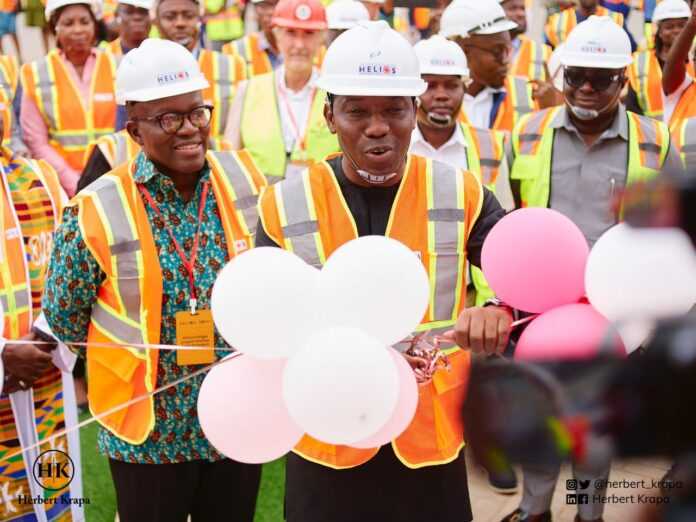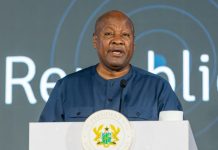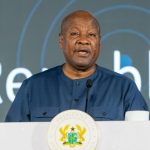Herbert Krapa, Minister of State at the Ministry of Energy, has inaugurated a rooftop photovoltaic solar plant generating 16.8 megawatts of electricity at the Tema Free Zones Enclave.

Mr. Krapa, dressed in protective gear, inspected the panels on the three-story rooftop and activated the switch for the $17 million solar plant. This project is part of the initiative to enhance electricity provision.
He praised Helios Solar Energy, a subsidiary of LMI Holdings, for spearheading the project and supporting the government’s goal of increasing renewable energy in the electricity sector.
The project was financed by the International Finance Corporation (IFC), a member of the IMF Group, and spans an area of 100,000 square meters.
The construction, connection, and installation of the entire plant were carried out by Ghanaian engineers and technicians.
The photovoltaic solar plant, owned by Helios Solar Energy, a subsidiary of LMI Holdings, is installed on the roof of Mega Warehouse.
Mr. Krapa assured that the government will continue to foster an environment conducive to private sector investment in renewable energy. He emphasized the significant role the private sector plays in advancing the government’s goals of growth, prosperity, and development, while also contributing to CO2 emission reductions.

He noted that while the government can provide some funding, the primary investment must come from the private sector. This project sets a precedent and demonstrates the essential role of private sector participation in achieving the goal of 10 percent renewable energy in the national energy mix by 2030.
Mr. Krapa highlighted that the project reflects global interest from private sector players willing to support the government’s targets. He expects these players to collaborate with the government to realize this vision.
The project also has substantial socio-economic benefits, including the creation of greener, sustainable jobs and contributions towards Ghana’s commitments under the Paris Agreement. Mr. Krapa noted that it introduces new skills and technology to young engineers involved in its development and maintenance, which will have a significant positive impact on the solar energy industry in Ghana.
He added that the project would also improve living standards and contribute to reducing industrial power costs, enhancing the competitiveness of the manufacturing sector. Over time, solar energy is expected to lower overall energy costs and support industries in meeting their green credentials.
Mr. Krapa emphasized that the project aligns with the government’s broader vision for the power sector and renewable energy.
He outlined the government’s commitment to protecting the planet through a National Energy Transition Framework, which was integrated into an investment plan launched by the President at the UN General Assembly last year.
He acknowledged that a substantial number of projects will be necessary to implement this plan successfully.





















































![[FREE FREE MONEY] Predict and Win a Guaranteed GH¢200 From Us EVERY WEEK](https://wordpress.ghanatalksradio.com/wp-content/uploads/2022/02/Predict-and-Win-Final-09-03-2021-218x150.jpg)
![[Predict & Win – 8th/Oct.] WIN A Guaranteed ¢200 From Us This Week](https://wordpress.ghanatalksradio.com/wp-content/uploads/2021/10/maxresdefault-16-218x150.jpg)
![[Predict & Win – 2nd] WIN A Guaranteed ¢200 From Us This Week](https://wordpress.ghanatalksradio.com/wp-content/uploads/2021/09/maxresdefault-50-218x150.jpg)
![[Predict & Win – 25th] WIN A Guaranteed ¢200 From Us This Week](https://wordpress.ghanatalksradio.com/wp-content/uploads/2021/09/maxresdefault-36-218x150.jpg)
![[Predict & Win – 18th] WIN A Guaranteed ¢200 From Us This Week](https://wordpress.ghanatalksradio.com/wp-content/uploads/2021/09/maxresdefault-23-218x150.jpg)









![[National cathedral] See full list of churches that have contributed since 2018](https://wordpress.ghanatalksradio.com/wp-content/uploads/2020/09/Ghana-National-Cathedral-GhanaTalksRadio-100x70.jpg)



